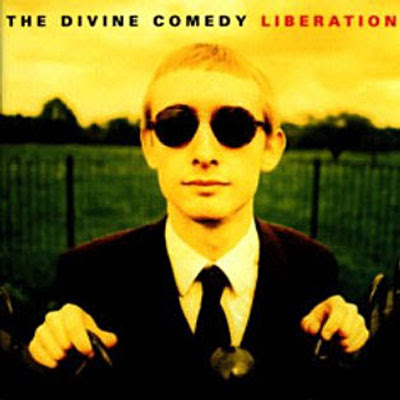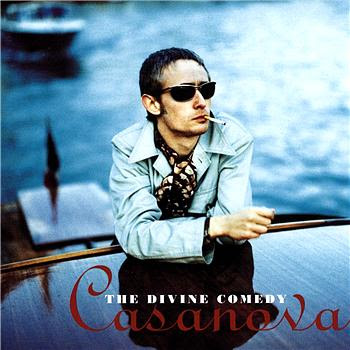2001's Desormais returns for the most part to the stripped back feel of Loneliest in the Morning, but this time out everything is even quieter, even more restrained and despite the occasional presence of a drum kit, it's all incredibly sedate. The songs are all sung in French and the overall mood is unremittingly downbeat. The introduction of some obscure electronic beats and noises is a nice touch but I don't think really adds much. Many people think this is Doiron's best album, but I don't think her songs are shown to best advantage when they're reduced so far. It's certainly very successful as a mood piece, but I don't hear enough melody in it all for my taste. Likewise the very similar follow-up, Heart and Crime (2003). Again, it's quiet and gloomy almost to the point of sounding despairing but I much prefer Heart and Crime to Desmormais, there's more immediacy to it. Nonetheless, if it's raining out and you want to feel wistful it's a pretty good choice, otherwise it doesn't really stand up as an album in its own right I don't think.


Finally we have 2004's Goodnight, Nobody. There is no great difference again between Goodnight, Nobody and the two previous albums. There is a lighter, airier feel to it than either Desmormais or Heart and Crime, but there's no real sense of development. It's still a lovely record, no mistake about that, but listening to all of the albums in one go hasn't really done them much of a service as the basic template remains too consistent throughout and I find myself wishing for something a little different by the time I've reached Goodnight, Nobody.

After her tenure in Throwing Muses and the Breeders and leading Belly, Tanya Donelly finally launched a solo career in 1996 with the double-7" Sliding and Diving. Lead song 'Bum' is a fizzing, lively tune, less directly pop than her work with Belly, but certainly more immediately accessible than the Muses or Breeders records. 'Restless' is a lovely low-key slow song with some plaintive pedal steel buried in the back of the mix which is nice touch. It always seems a surprise when Donelly turns out a delicate acoustic number, but she's certainly good at them. The other two songs are pretty decent ('Human' is a furious bit of indie-pop and 'Swoon' is a fairly rough early version of a fantastic song that would be properly fleshed out on the debut album) but it's the songs on the first 7" that are the real keepers. The debut solo album, Lovesongs for Underdogs is a terribly underrated album. It may be a glisteningly slick record, keenly produced and buffed up with a pop sheen that's almost blinding, but it's also got some superb pop songs on it, and Donelly's way with a slightly off, somewhat unpredictable pop melody is at a peak throughout Lovesongs for Underdogs. I think people were maybe disappointed that she was prepared to make something so unashamedly crowd pleasing, but when you've got the songs, you might as well show them off. If there is a difficulty it's maybe that the high polish makes the record start to sound samey, and you need to keep an ear out for the highlights, but there are many of them and worth making the effort for.

2004's Whiskey Tango Ghosts has none of the bubbling indie guitar pop that Donelly had been trading in for the most part and is instead composed of quiet, slightly countrified downbeat songs that trade in big melody for a kind of emotional honesty instead. A delicate but somewhat gloomy record, Whiskey Tango Ghosts has some of Donelly's most sophisticated songwriting, but it's lacking in the sprightly off-beat sensibility that she had made her own. As such it's an impressive but oddly cold record, one to admire more than adore.
One thing that has always confused me about those indie halfwits at Pitchfork is that while they fall over themselves to fawn over the most moronic mysogynistic rap records, they can't abide big dumb rock music. It's strange because the very things they seem to abhor in rock are often the self same things that they laud as challenging or exciting in the most unpleasant hip hop and rap. In any event, it's no surprise that they despise the Donnas, who quite brilliantly they have openly accused of being anti-feminist because they're women playing cruddy cock-rock. It's ironic that male writers for Pitchfork should accuse women of being anti-feminist for playing dumb rock music and not only not criticise but actively praise male rappers who spew out the most repellent women-hating shit imaginable, no? Anyway, I have no truck with this pathetic indie dork muddled thinking, and I enjoy the Donnas records a lot. But then I like rock music. Third album, Get Skintight (1999) was the first Donnas record that moved away from the Ramones-a-like stuff that they had churned out on their first two albums, and was tellingly the first that they wrote themselves, hence the timid post Alice to post Crue influences showing in the background. For the most part it's still buzzsaw guitars and "yeah yeah" chanting punk pop, with lyrics about going out, ripped jeans and not doing much. It's great fun, and has no great ambition to do anything but be a good time.

Fourth album The Donnas Turn 21 (2001) reduces the scrappy punkiness further, making more room for simple rock riffing and more stupid stories of adolescent love, lust, angst and party going. It's a great record, buzzing from one 3 minute dose of rock pop with a punk edge to another. It's all knockabout, throwaway and silly, but it's still tons of fun. I think people see the Donnas as a kind of wannabe female Motley Crue, but the riffs are much closer to a rudimentary blues boogie and have a much closer affinity to AC/DC than to any hair metal. A lot is given away by the inclusion of a fine cover of Judas Priest's 'Living After Midnight'. The production is cleaner and the performances are more polished, and there's even the sense that they might nearly be able to play properly. I guess the ambition to be a rock rather than a punk act was sharpening everything up. I like Turn 21 a lot, it's stupid, it's fun and it knows exactly what it is and what at isn't and doesn't pretend otherwise.

And then by 2002's Spend the Night the punk is gone and it's all about the riffing. An even dafter record than usual, Spend the Night is a real rock record that clearly had potential chart action in its sights. Its super-shiny production and slick pop-rock styling is all pretty polished and there was clearly an ambition at play here (they nearly made it with a minor chart showing for the obvious single choice 'Take It Off'). They never actually pulled it off, but whatever, this is the album that the Pitchforkers particuarly loathed and it's the one I love the most. This is heads-down rock that only a really smart band could make sound so dumb. It's a fantastic bit of riff heavy rocking and to be honest I can't see what's not to love. Everything about it (including the ridiculous cover) is designed to be indeterminately anachronistic (I guess 1977 would be a fair guess at what's intended) and it works beautifully.














